Federal Agencies Exit COVID-19 Public Health Emergency With Majority of the Public’s Trust
Series Introduction
Since 2020, Morning Consult has surveyed hundreds of thousands of Americans in ongoing surveys to gauge the effects of the COVID-19 pandemic on public opinion and behaviors across a wide range of categories, from politics and economics to moviegoing and dining. Now that the World Health Organization has declared an end to the COVID-19 global health emergency, this series explores how much has returned to normal — and how many norms are lost entirely.
Read our coverage: Going Out | Vaccine Mandates
For our latest global health care data and analysis, sign up for our daily health news briefing.
As the U.S. COVID-19 public health emergency expires Thursday, the public has more trust in health information and news from multiple federal agencies and providers than from the White House, insurance and pharmaceutical companies, according to a new Morning Consult survey.
The Public Trusts Providers, U.S. Health Agencies Much More Than the White House, Companies for Health Information
Americans say they trust health news from pharmaceutical and insurance companies more than the White House
- More than 4 in 5 U.S. adults said they have “a lot” or “some” trust in health information and news from providers like nurses and doctors, the most of any entity surveyed, while about half said they trust health information from the White House, the least of those surveyed.
- Among all adults, 7 in 10 said they trust health information and news from the Food and Drug Administration, and a roughly equal share said the same of the Centers for Medicare and Medicaid Services, the Department of Health and Human Services and the Centers for Disease Control and Prevention. Meanwhile, 2 in 3 said they trust information from local governments, and a similar share said the same of state governments.
- The public trusts information from hospitals (77%) and retail pharmacies (69%) much more than from medical device (59%), pharmaceutical (54%) and insurance (53%) companies.
Democrats Trust Every Health Agency, Industry More Than Republicans for Public Health Information
Democrats more likely than Republicans to trust federal agencies for health information
- Nearly 3 in 4 Democrats said they trust health information from the White House, double the share of Republicans. There was a similar partisan divide for the World Health Organization: 81% of Democrats said they trust information from the international health agency, compared with 46% of Republicans.
- Among Republicans, 64% said they trust public health information from the FDA, followed by CMS (62%) and HHS, CDC and the National Institutes of Health (57% each). Meanwhile, more than 4 in 5 Democrats said they trust information from each federal health agency.
- Democrats and Republicans said they trust information from hospitals and providers more than any other entity surveyed (along with the CDC for Democrats), while both groups were much more critical of other health care companies.
Net approval for the CDC’s handling of the pandemic rebounds
The COVID-19 pandemic thrust federal health agencies into the public spotlight in a way the United States had rarely seen before, contributing to the erosion of trust in crucial parts of the country’s health system.
The CDC was criticized for its response to the pandemic, which led to an overhaul of the agency to better respond to a future emergency. One change the CDC will now have to make — in addition to the ongoing overhaul — will be finding a new leader after CDC Director Rochelle Walensky said last week that she would step down on June 30.
Walensky’s resignation comes after the public’s opinion of the agency has significantly declined since the beginning of the pandemic. Among registered voters, the net approval for the CDC’s handling of the pandemic plummeted from plus 66 in April 2020 to plus 28 this month (58% approve, 30% disapprove), according to Morning Consult tracking data. However, net approval for the agency has increased from a low of plus 16 in January 2022.
The April 27-28, 2023, survey was conducted among a representative sample of 2,211 U.S. adults, with an unweighted margin of error of +/- 2 percentage points.
Ricky Zipp previously worked at Morning Consult as a health care analyst on the Industry Intelligence team.
Related content

Americans Just Want to Have Fun at Restaurants, Concerts and the Movies Again

As COVID-19 Vaccine Mandates End, a Slim Majority of Americans Still Supports Most of Them
